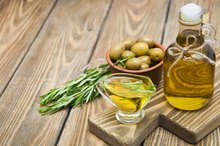How to Use Mullein Herb
Mullein herb is made of dried whole mullein plants, which can be found in abundance throughout Asia, Europe and North America. The herb has been used in alternative medicines for centuries, and, according to AllNature.com, modern research has established its effectiveness as analgesic, anti-inflammatory, antioxidant, antiviral, estrogenic and hypnotic. It is an expectorant that helps clear the lungs of mucus buildup and is sometimes used in the treatment of bronchitis, although this application has not been scientifically studied, according to the University of Maryland Medical Center. There are several ways to use mullein to improve your health 1.
Use 3 g of mullein herb daily as an expectorant, according to the University of Maryland Medical Center. You can use the herb in bulk or in capsule form.
What Foods Have the Herb Ginger in Them?
Learn More
Boil 1 tbsp. of dried mullein leaves or root in 1 cup of water for five to ten minutes. Strain the tea and drink it, according to AllNature.com. You may also substitute milk for water if desired, and add sugar or another sweetening agent.
Roll up mullein leaves into cigarette paper or place them in a pipe and smoke the herb to treat congestion in your lungs. This can be dangerous when done for a prolonged period of time and should only be used on a temporary basis.
What Are the Benefits of Chickweed Tea?
Learn More
Take about seven drops of mullein herb tincture to treat a tweaked or sore back, according to HerbCraft.com.
Rub the leaves of mullein plants onto your skin as a natural insecticide and bug repellant, as suggested by HerbCraft.com
Warnings
Do not consume mullein seeds. They contain narcotics and saponins and are toxic.
Smoke at your own risk. While smoking mullein herb may provide short-term relief, long-term use is dangerous.
Related Articles
References
- Alternative Nature Online Herbal: Mullein
- Jim McDonald Herbalist: Mullein
- Mullein. Natural Medicines Database. Professional Monograph. 7/26/2018
- Riaz, M., Zia-Ul-Haq, M., Jaafar, H. Common mullein, pharmacological and chemical aspects. Revista Brasileira de Farmacognosia. 2013; 23(6), 948-959. doi:10.1590/S0102-695X2013000600012
- Sarrell EM, Cohen HA, Kahan E. "Naturopathic Treatment for Ear Pain in Children." Pediatrics 2003 111(5 Pt 1):e574-9.
- Turker AU, Camper ND. "Biological Activity of Common Mullein, A Medicinal Plant." Journal of Ethnopharmacology 2002 82(2-3):117-25.
- Turker AU, Gurel E. "Common Mullein (Verbascum Thapsus L.): Recent Advances in Research." Phytotherapy Research 2005 19(9):733-9.
Warnings
- Do not consume mullein seeds. They contain narcotics and saponins and are toxic.
- Smoke at your own risk. While smoking mullein herb may provide short-term relief, long-term use is dangerous.
Writer Bio
Jonathan Croswell has spent more than five years writing and editing for a number of newspapers and online publications, including the "Omaha World-Herald" and "New York Newsday." Croswell received a Bachelor of Arts degree in English from the University of Nebraska and is currently pursuing a Master's of Health and Exercise Science at Portland State University.









